Humankind gets rid of a lot of the things that annoy me about Civilization
It doesn't outdo the king of one-more-turn grand strategy in every respect, but the challenger is looking smart.
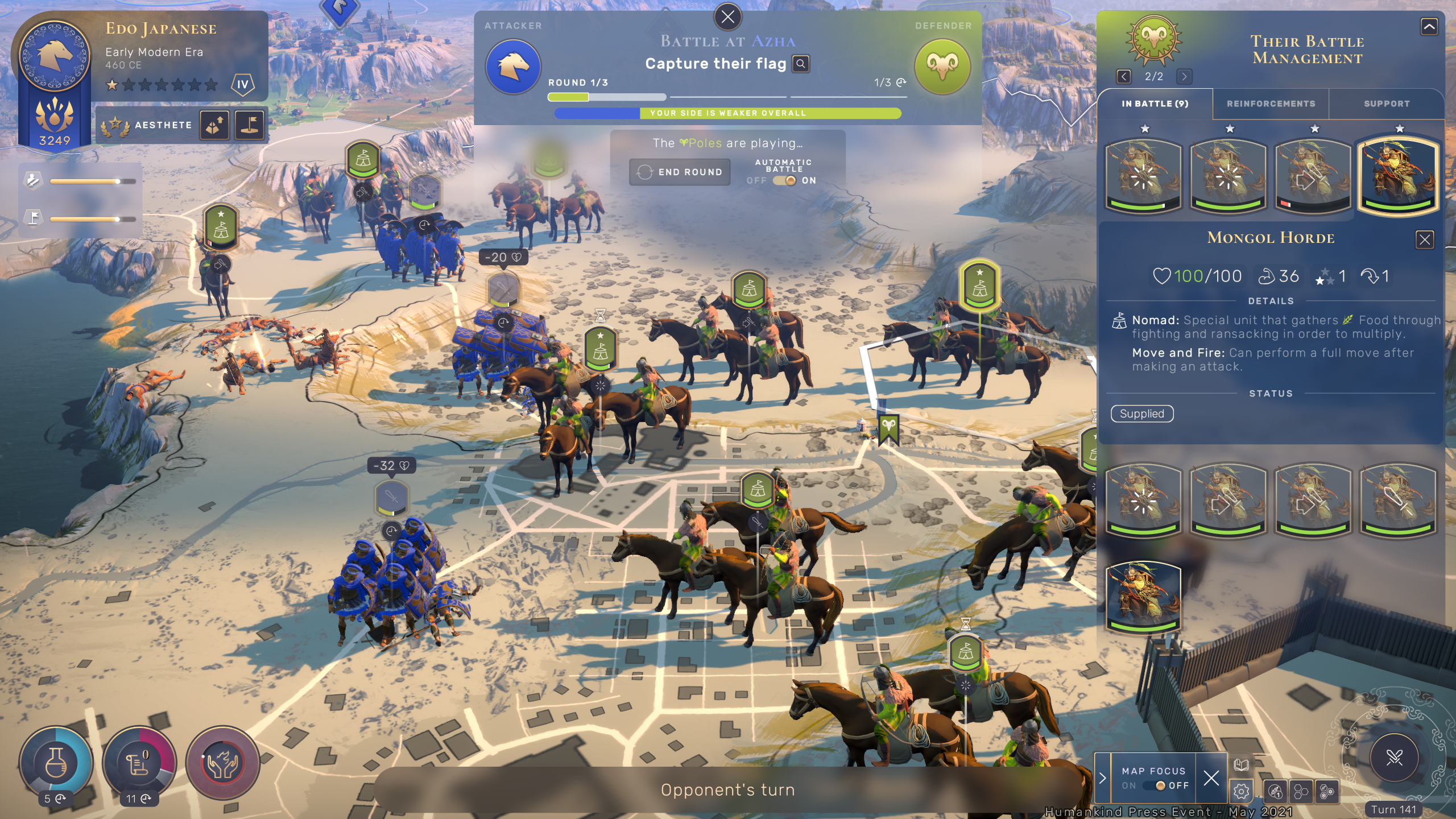
I love the beginning of a Civilization game, when I'm exploring my little piece of the map and imagining the layout of my future society. It always goes by too fast, though: a handful of turns in, I'm locked into a location and a strategy, and the race is on. In contrast, Humankind draws out that early game in some really pleasing ways, and replaces some of Civ's harder decisions with more flexible systems. It feels like Amplitude (also the maker of Endless Space and Endless Legend) sat with each turn of a Civ game and thought: What isn't fun about this turn? Can we get rid of it?
I've only played a few hours of Humankind, so I can't say much for sure yet. I didn't get a good sense of the mid- and late-game, and only got a peek at what's possible in the early turns. I did encounter a couple of bugs, or maybe just AI quirks, though: At one point, a civilization I was at war with chose not to interfere with my units while I sieged and captured one of its cities, passively watching the carnage. I'm not confidently in love with Humankind at this point, but bugs can be fixed, and I really like some of the ways it tweaks Civ's style.
The first turns
At the start of a Civilization game, for example, you're encouraged to exhaust your Settler unit as soon as possible to create a city and get started on building projects. Making decisions with limited information like that can result in tricky and fun problems to solve later on, but it can also be pretty disappointing when you discover a much more advantageous, or even just scenic, spot for your capital city just a few squares away from where you plopped it down in a rush. In contrast, Humankind doesn't pressure you to pick a forever home immediately, and that's mainly because you don't need a city to make new units. Your starting warrior unit is self-replicating, which totally changes the feeling and pace of the first turns.
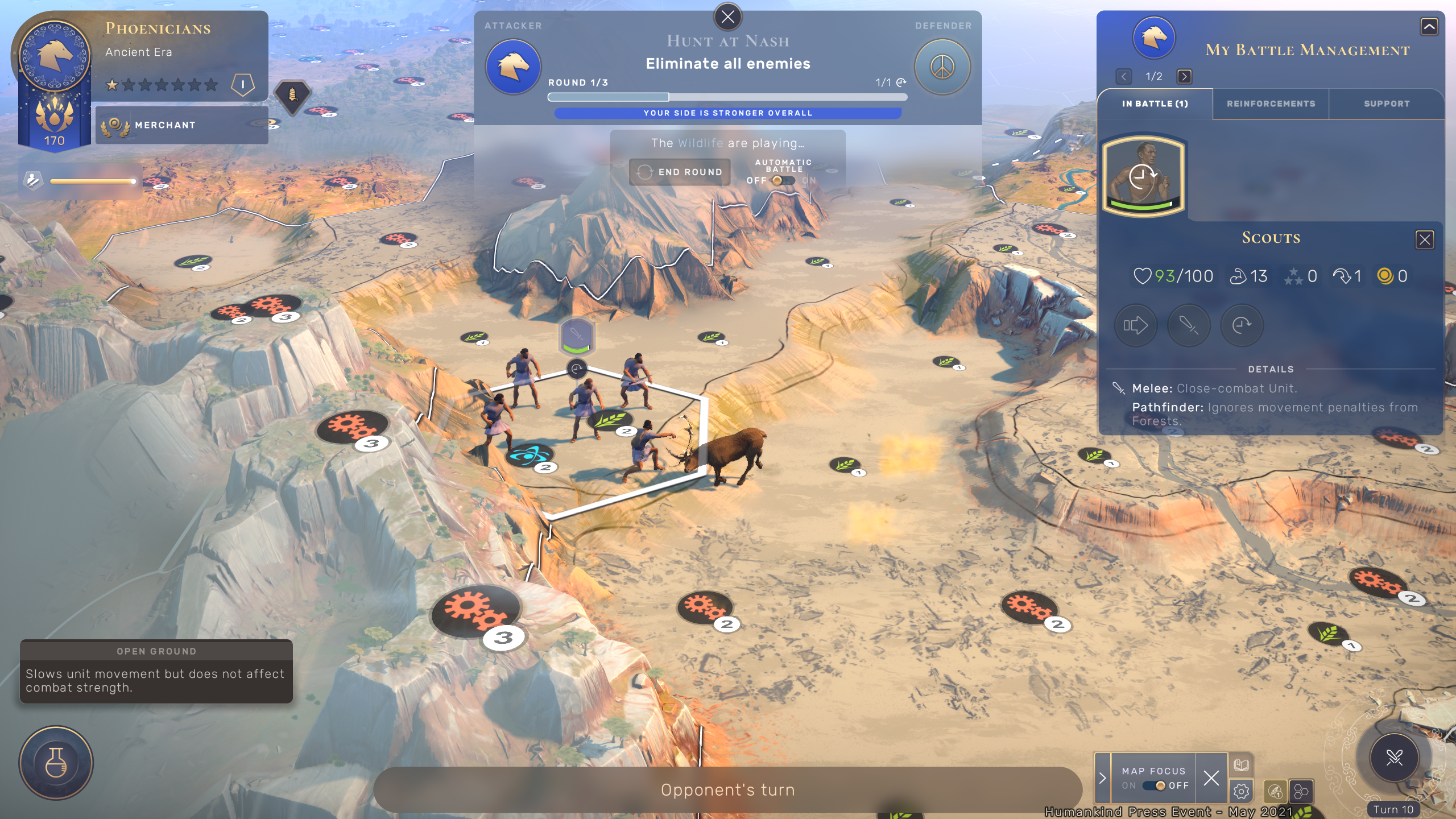
If you send your initial band of nomad fighters wandering into food sources, it'll eventually collect enough grub to spawn a copy of itself. Multiple units can occupy the same tile in Humankind, so the new unit just becomes attached to the old one, but you can split it off and send it to explore elsewhere. At that point, you have two nomadic groups collecting food and potentially multiplying, so your army can grow exponentially even before you have a city. The developers told me they saw some players focus entirely on building a nomadic army in their early turns with a plan to overwhelm city-building societies and take their outposts. It didn't work out for them, but I like that at least for a while, you could roleplay as the Goths and try to sack Rome. It's a nice example of a game system supporting historical storytelling without forcing it.
Building cities
City creation is also handled differently in Humankind than it is in the Civ games. To found an outpost (which is distinct from a city), you need to expend a resource called Influence, as well as a unit's movement for a turn, but after that it's free to go on its merry way. Outposts just do their own thing, generating resources and growing (or not, depending on conditions), but after a handful of turns, you can spend more Influence to turn an outpost into a city where you can build infrastructure, districts, wonders, and new units.
You don't have to turn every outpost into a city, though. This is another place where Humankind improves on Civilization, in my view. In Civ, if you want a strategic resource that isn't near one of your cities, your best course of action is to send a settler over there to found a new city. Humankind allows you to attach an outpost to a city, expanding its reach without creating another building queue to manage. It's a nice solution.
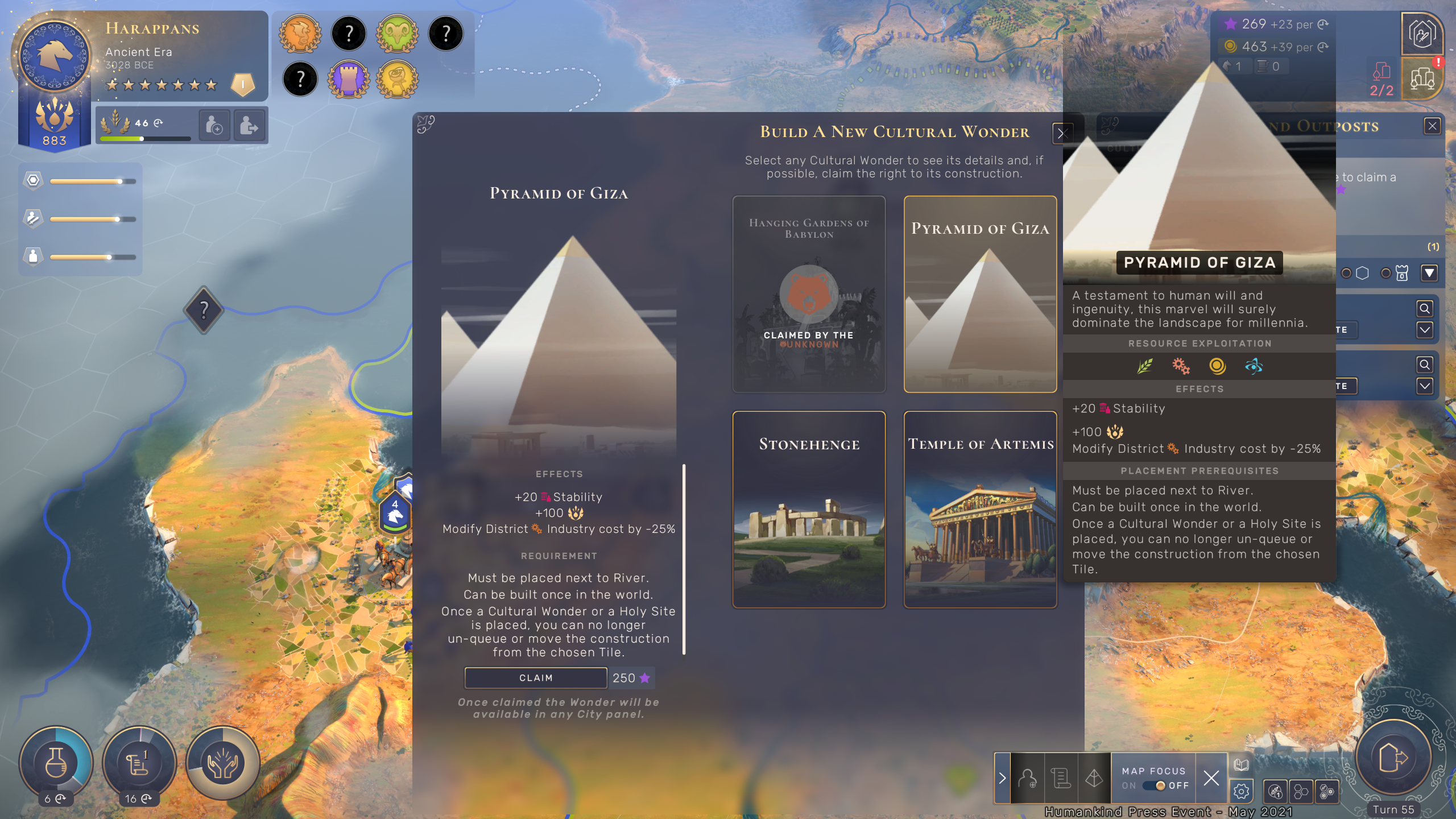
Other tweaks to Civ's formula
- Instead of fighting barbarians, you start out fighting wildlife in hunts. It's a small difference, but I never really enjoyed clearing barbarian camps in Civ games. (Though it's a bit weird watching a unit take a thrashing from a single deer.)
- In Civ, your hopes of owning a certain world wonder can be dashed if another player completes the same project first. The thrill of the race is lost in Humankind, but methodical city planners may like that unique structures such as the Great Pyramid of Giza must be claimed before being built, and can only be claimed by one civ. No stealsies.
- Like Amplitude's Endless Legend, the map has elevation, not just mountain tiles, and so you can really nestle cities into cool, defensible spots.
- The map is divided into sectors which represent where the borders of an outpost/city will extend to. If I want to occupy a certain stretch of land, I know exactly how many cities and outposts I need and where to put them. No guesswork!
- Whenever a civ establishes an outpost near your border or does something else annoying, it generates a "grievance." You can ignore grievances, or you can use them to make demands, such as that they hand over that outpost near your border (which probably screwed up your plans). You can end up taking it back or going to war over it, but what I love is that Humankind gets what's going to piss me off as a player and gives me recourse: a path to war that makes sense both as someone roleplaying a head of state, and also as someone who wants to build cool pretend cities in nice patterns.
The culture system
Humankind's flagship feature is its biggest departure from Civilization, and I like it a lot. Rather than choosing one civilization to be, you choose a starting culture. At first, it seems like the same thing. The culture you choose gives you certain bonuses and special buildings and units, and you build your strategy around those things. The difference is that you aren't stuck with that culture. When you enter a new era, you can choose to double-down on your existing culture, or pick a new one, giving you different bonuses. Each time you transition to a new culture, you hold onto a bonus from your previous culture, so you don't lose that identity entirely.
Keep up to date with the most important stories and the best deals, as picked by the PC Gamer team.
I didn't realize how significant the culture system is until I played. In my first go, I was having a disappointing time as the ancient Phoenicians. They have sea-related bonuses which I was making very little use of. But then I got the Classical Era and realized, oh, I can just be the Celts now if I want, and totally change my strategy, and maybe my legacy Phoenician bonus will come into play later. The system gave me new energy when, in a Civ game, I might've just felt a bit defeated and restarted. Another strong tweak, at least at a glance.
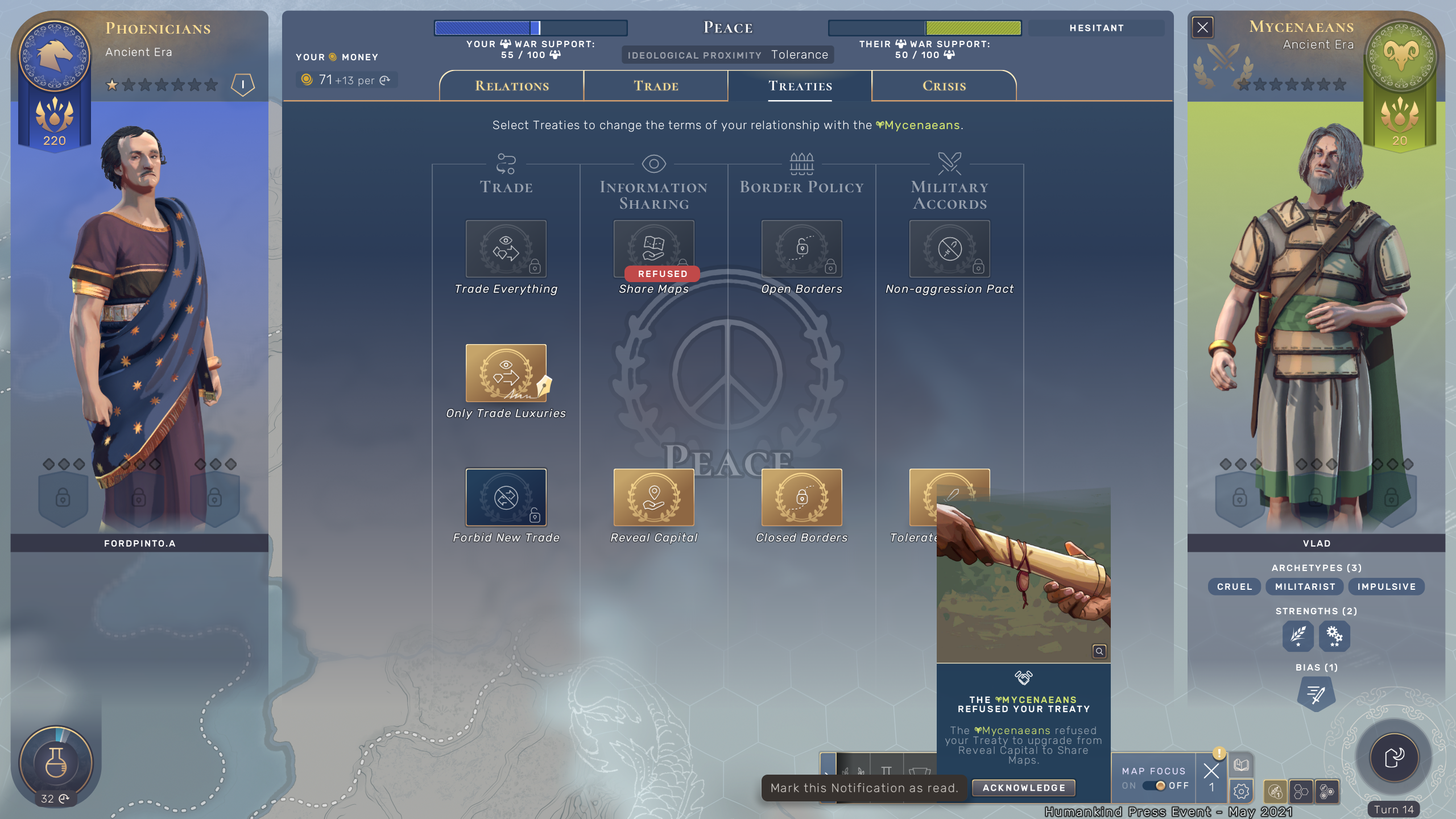
I don't want to make Civilization out to be a junker here. It's one of the most popular videogame series ever for a reason, and neat adjustments to its knobs won't necessarily turn out to be winners in the long run. I have trouble identifying why, but I didn't get as attached to my Humankind cities as I do to my cities in Civilization 6. Perhaps there's something to Civ's stricter system, in the end?
Humankind's random events also didn't excite me much. You get a short prompt about priests arguing over gender roles or rats getting out of hand, and make a decision that nudges a stat one way or another. It just feels like a distraction. The notification bar can also be annoying (I don't need to know every time another leader's opinion of me has changed in an unspecified way!) and there are other interface annoyances (although it is quite beautiful, as it is in all of Amplitude's games). Another concern is whether the AI will be irritating or interesting to deal with; hard to say after just a few hours.
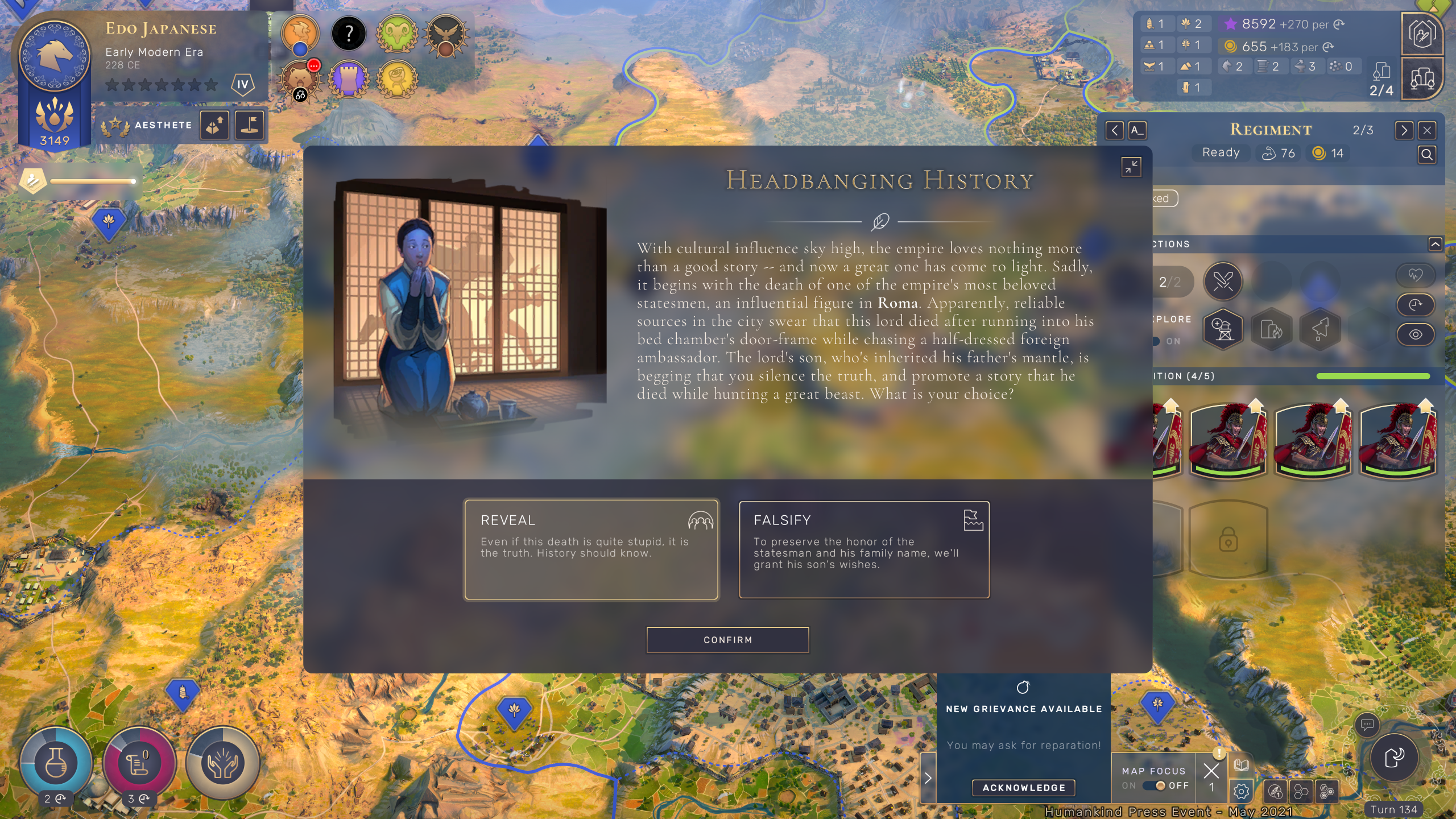
I wasn't quite as charmed by Humankind as I am by Civ games, though both go for a similar tone. Civ has a huge advantage there, which is that I've been playing variations on it for around 30 years, so maybe more time in Amplitude's version of world history is all that's needed. For the most part, my first impressions of Humankind were good. It distinguishes itself from Civilization in ways that all feel well-considered; nothing seems like it was added just for novelty's sake. And, like Civilization, Humankind will be moddable—including the AI—so ambitious players can set out to change anything they don't like. It'll be out on August 17, and I suspect it'll be the cause of at least a few late nights of clicking.

Tyler grew up in Silicon Valley during the '80s and '90s, playing games like Zork and Arkanoid on early PCs. He was later captivated by Myst, SimCity, Civilization, Command & Conquer, all the shooters they call "boomer shooters" now, and PS1 classic Bushido Blade (that's right: he had Bleem!). Tyler joined PC Gamer in 2011, and today he's focused on the site's news coverage. His hobbies include amateur boxing and adding to his 1,200-plus hours in Rocket League.

